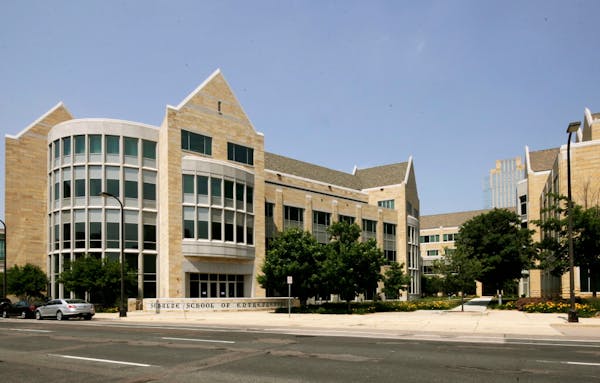The good news for 18-year-old Zakaria Elmi was that he got accepted into his "dream school," the University of St. Thomas. The bad news: His family couldn't afford it.
So Elmi figured he'd go to community college this fall. But instead, he'll be heading to St. Thomas after all to attend its first two-year college, which was designed — and priced — especially for low-income students.
St. Thomas, a private Catholic university, is launching the Dougherty Family College at a fraction of its regular tuition and fees — $15,000 a year instead of $41,133. After scholarships and grants, the neediest students will pay no more than $1,000 a year.
So far, the new college, which had been expecting 150 students in its debut class, has filled less than half the seats. But its dean, Alvin Abraham, says that's not surprising, noting that the newly accredited college only began accepting students in June, and orientation begins Aug. 14.
At this point, "we would feel really excited and happy to have 75 students for our kickoff," Abraham said.
And as word spreads, he expects applications to start flooding in for next year.
Beyond the cut-rate price, Dougherty college offers a host of incentives for students: It will supply textbooks, a Metro Transit pass, a laptop and even breakfast and lunch "at no cost to students," Abraham said. "We're trying to reduce any barriers," he said, to help students "stay focused on academics." It will also offer all students paid internships, as well as tutors and coaches to help them academically.
Suban Abdi, an incoming freshman from Eden Prairie, said some of her friends didn't believe her when she told them about Dougherty. "It's two years free and then it's a lot of good stuff," she said. "They would say, 'Oh, there's no school that would [do that].' "
Dougherty is believed to be only the second college of its kind in the country. The first, Arrupe College, opened at Loyola University in Chicago in 2015.
St. Thomas announced its plans to open the college last November, saying there was a "pressing need" for more pathways for disadvantaged students into higher education. St. Thomas raised money from donors and named the new college after its lead benefactors, Mike and Kathy Dougherty
The goal, say St. Thomas officials, is to attract promising students who face financial or other struggles that could derail their college careers and give them the help they need to succeed.
The Dougherty students will be in separate classes taught on the Minneapolis campus, but they can take part in activities on the main St. Paul campus as well.
Elmi, who graduated in May from Blaine High School, was ecstatic when he heard the college was opening this year. "It was a surreal experience," as well as perfect timing, he said. As one of five children, he had abandoned all hope of going to St. Thomas as a traditional freshman when he learned that it would cost about $15,000 a year, after financial aid. "It was too much," he said.
At Dougherty, he'll pay $1,000 a year for a two-year degree, and ultimately he hopes to earn a four-year degree in computer science.
Cin Morris, 17, an incoming freshman from Minneapolis, said he was "really, really disappointed" when he was rejected by his first-choice college.
He readily admits that his grades weren't always the best; growing up, he had an unstable home life and often skipped class.
But at 16, he discovered a passion for theater and started taking school seriously. Now, he can't wait to start college. "I'm excited, because Dougherty Family College has given me that opportunity to succeed," he said. He plans to do well, he added, "because I don't want to disappoint anybody."
Abraham, the dean, says potential students are still calling up, and there's still a chance to be admitted for this fall. "[We're] working around the clock to move students through the process," he said. "The turnaround time is extremely quick."
By next year, he says, he doesn't think filling the classes will be a problem. With a full season to recruit high school seniors, he predicts, "we will have an overabundance of student applicants for the 150 spots."
Maura Lerner • 612-673-7384

Want to share info with the Star Tribune? How to do it securely

'Safe recovery sites' would offer syringes, naloxone and more to people using drugs. The plan could be in peril.
New Minnesota GOP leaders seek peace with party's anti-establishment wing

Who is Republican Lisa Demuth, Minnesota's first House speaker of color?

